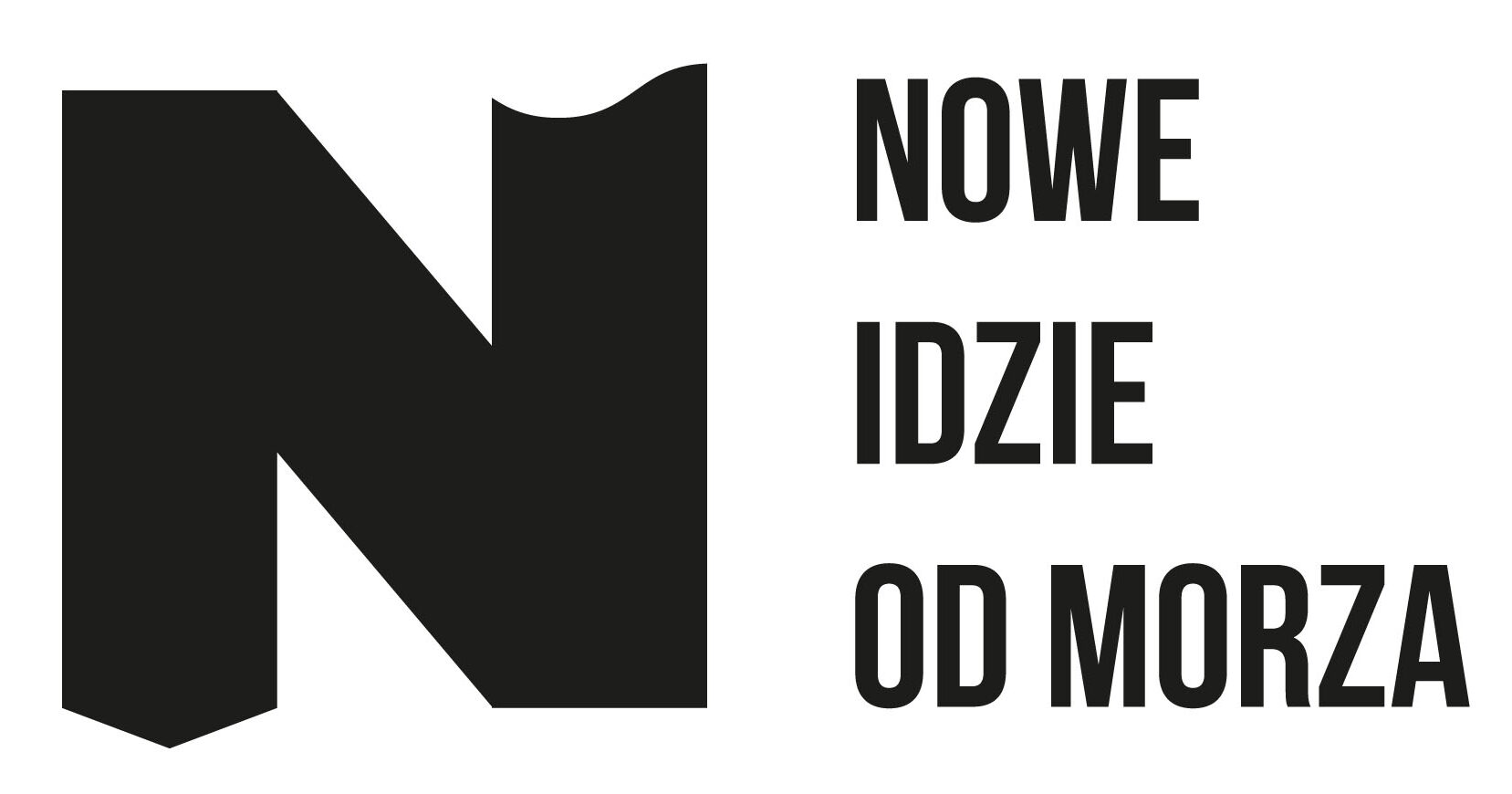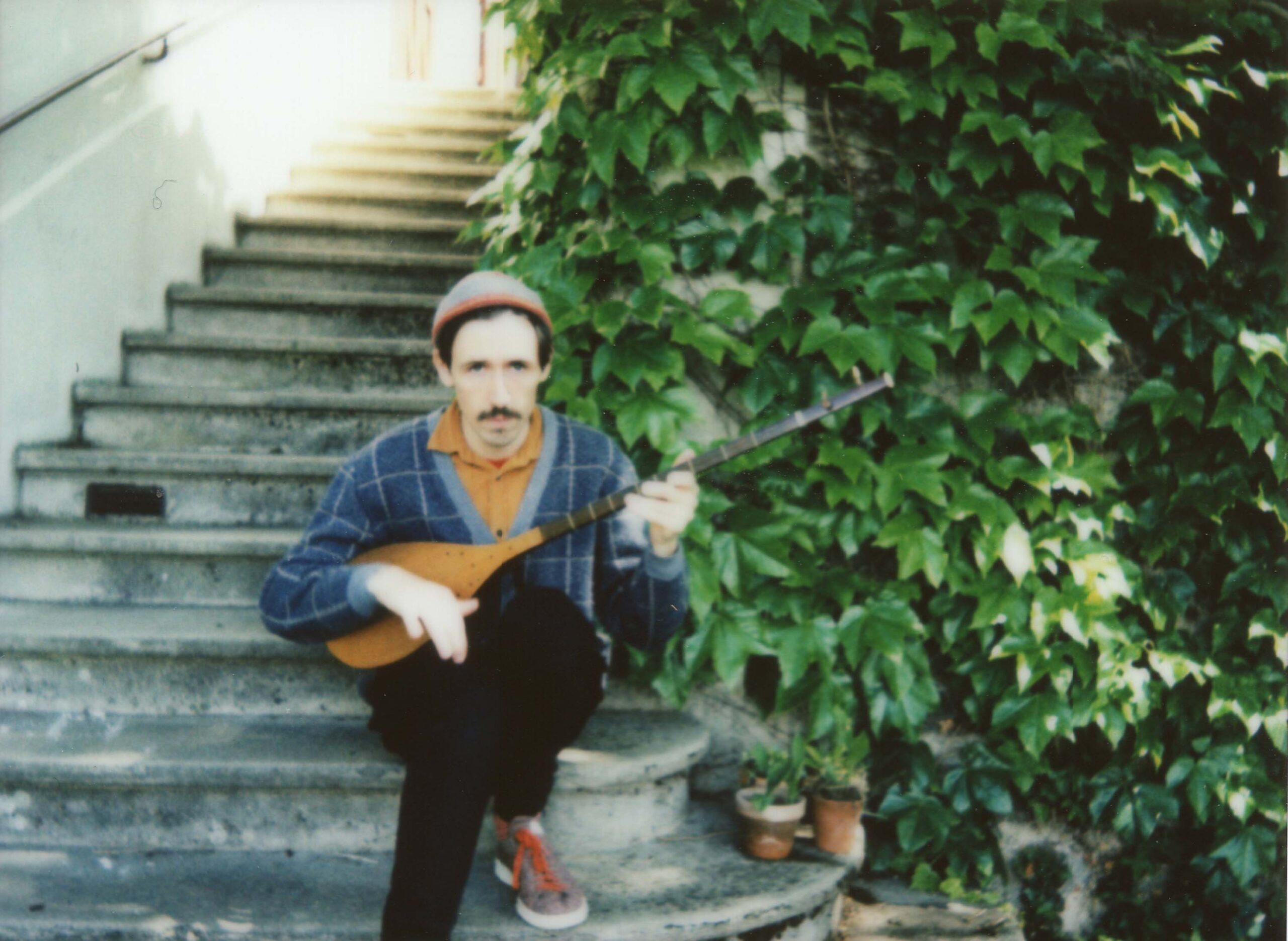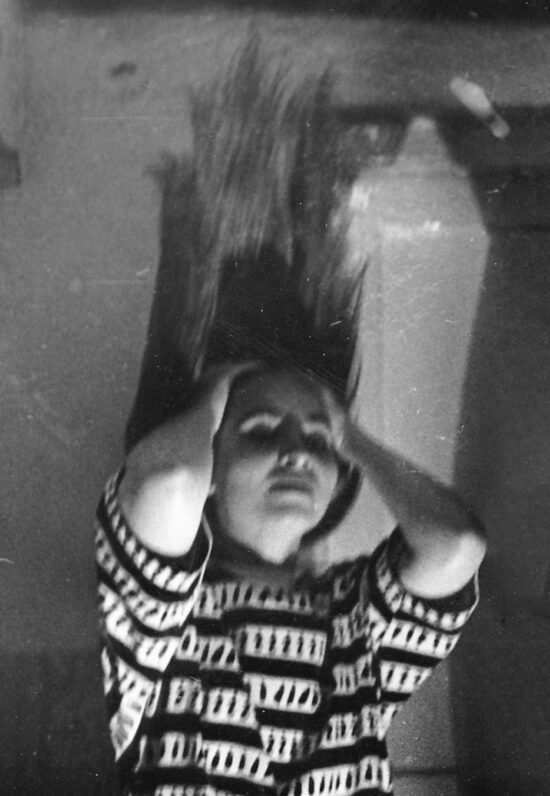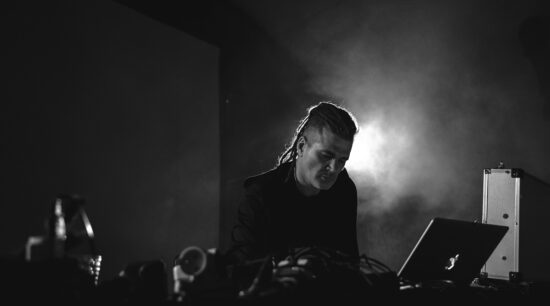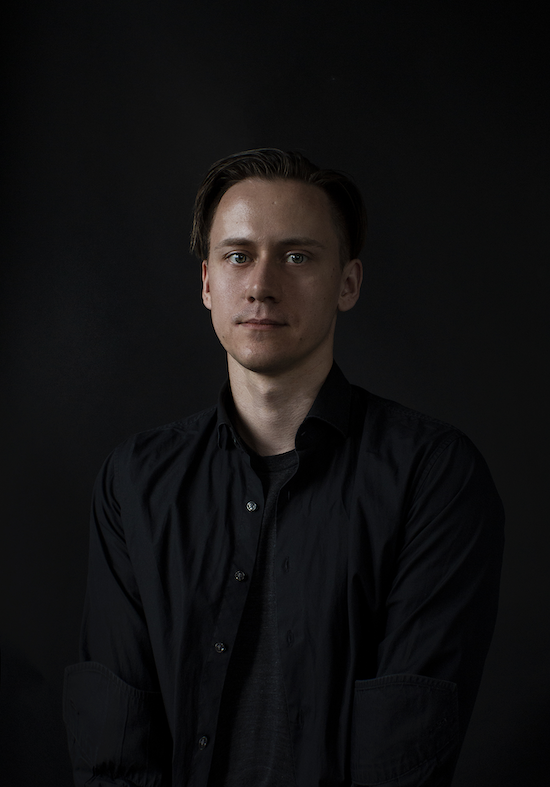– A lot of stuff is melted together but in the music of La Nòvia, Cocanha, even in my music there’s this idea of doing actually traditional music, living traditional music. I think it’s because we are a generation that wasn’t cut off from traditional culture. It’s not about making a museum, it’s about putting a lot of yourself into it – says Ernest Bergez, composer, vocalist and creator of the Sourdure, Kaumwald, Tanz Mein Herz and Orgue Agnès.
Translation: Aleksandra Szkudłapska
De Mòrt Viva is undoubtedly one of the most interesting albums released in 2021. Ernest Bergez is a recognizable figure on the French scene – he creates solo, as part of the duo Kaumwald, but also in the post-punk Orgue Agnès or the trance ensemble Tanz Mein Herz. On the one hand, he relies extensively on new technologies; on the other, he is rooted in organic sounds and builds on musical traditions.
His latest album is a colourful folk tale written from the perspective of the periphery. It talks about searching for one’s identity in today’s globalized world, shining a light on regionalisms and the mystical form through which traditional music can sound surprisingly up-to-date. Bergez sings in French and, above all, in Occitan. He comes from this region, which inspires him to create universal stories, rooted in place, drawing on instrumental traditions, but also, in a way, close to all those who – not only because of the pandemic – have noticed that the division between the centre and the cultural margins is blurring, up to the point of relativizing what we can call global or local.
The ten tracks on the album combine the sounds of traditional instruments, such as vielle à roue (of the hurdy-gurdy family), cornet à bouquin and cabrette, sampled and treated in the post-production process. The listener is not always able to recognize what is actually acoustic and what has been created through musical synthesis. The whole is cut into relatively short, sometimes song-like pieces, with hovering vocals, oozing the idea of urban-rural psych-folk.
I interviewed Bergez about Occitania, centralization in France, his inspiration behind recording this album, tradition, recording alone at home, but also about the obsolescence of terms such as world music and folklorization.
JAKUB KNERA: In Poland, people often divide the country in public discourse into Warsaw, the capital city, and the rest. What is it like with Paris and France?
ERNEST BERGEZ: I have to say that you hit the first arrow right in the centre! The centre of what I’m trying to do with music and my way of life. In France what’s basically been happening for centuries is a kind of centralization around Paris. Since the French Revolution, there’s been a plan to transform this country into a nation state: it had to have a common language, some common laws and cultural grounds. This used to be the case and somehow it still is, because people who don’t live in Paris live in some different realities.
Like you? You live in Thiers in the Auvergne province.
I do live in a different reality right now, but I know people from Paris, I have friends there, I sometimes go there to play and work, I collaborate with the labels and my booking agents are from there. But the real problem is this configuration of centralized culture and centralized way of seeing what constitutes the main identity of the nation.
It’s very tied up with the French language – most of the people in the north think that they don’t have the accent because they speak the standard language. Which is false – they have a northern accent. And right here, in Thiers, people have a strong accent in French, but they don’t feel like they speak some strange French. They just speak “their French”. But that’s not possible as an official way of looking at the language in France, it’s not possible to have a room for different ways of speaking.
I can talk a lot about how it’s working out for musicians in France as there’s a lot of people who go to Paris because they think this is where everything happens.
Exactly like in Poland.
I’m totally against that. What I see in my daily life is the country. Every day I see a proof of every place being its own centre.
I’ve lived in Auvergne since I was six. Half of my family is from that area, but later on I moved to Lyon, which is a big city. I left Lyon 10 years ago because I realized that from the start, I’m not a guy from the city, I’m a guy from really remote suburbs. I don’t feel comfortable inside, where everything is at its busiest.
When I went to Auvergne, things started to open, the creative process started to open. I came here to be in a place where traditional music was alive. I started learning the Occitan language. When I took my things and moved to Auvergne, I was a bit disappointed to find no-one around me who’d actually speak Occitan. There were really few living elements of that. Later I discovered people speaking the language and living elements of the language and culture, but I wasn’t able to see them at the beginning.
Now in Thiers I am friends with some people that speak the language. That’s a huge change and it is important for me culturally to be rooted in reality. I have to think in Occitan to understand a song or to write.
These Occitan-speaking people, are they old or have they learned like you?
Both. I know two people who were born in Occitan-speaking families. There’s another friend whose parents speak it but not in everyday life. He learned it because of his own personal motivations and right now he speaks really well. Every conversation we have when we see each other or on the phone is in Occitan. I think it represents the statistics quite well.
Are there any institutions that are trying to save this language?
There used to be plenty of them. Now it’s not like in the seventies when parents wouldn’t speak it because they wanted their children to speak correct French so they could have a job and advance in society. What happened on the political-social ground is quite harsh. For centuries, there was a social distinction between people who were speaking correct French and those who were mainly speaking patois.
What’s patois?
It’s a word introduced by people speaking Standard French for another language, as if those languages weren’t seen as proper ones. It’s a bad word which got into popular language. Everywhere you go down south people speak patois or if you’re in Provence, they speak Provençale.
Are people saving languages in other regions in France?
Actually, most of the areas in France have lost or almost lost their local languages. There are lots of associations and official efforts to maintain the language in Bretagne, which is the most well-known in France, as well as in Languedoc and Toulouse, which right now is regarded as the actual region of Occitania. But that’s a new centralization. This city is centralizing everything but nobody knows about it in the Massif Central area or in Auvergne.
I’m trying to create a small image of Occitan in the picture of that country we call France. I’ve been learning it from 2015 but I can write a poetry form in this language. It may not be 100% correct, but I prefer to speak incorrect Auvergne-Occitan that not to speak it at all.
I can read in French but not in Occitan. Could you tell me what you are singing about on De Mòrt Viva?
I can say it’s a kind of a concept album. I didn’t think about the songs separately from one another. It’s a continuity – you can jump from one song to another in every sense, there are words that are coming back.
At the beginning I wanted to write something within the idea of paganism right now. I wanted to speak about the carnival, those common beliefs we have that are not grounded in rationalism but are still active. I wanted to say that we need that kind of thinking and spirituality. It’s also about what’s important for us as human beings now, considering social existence and animal existence. That’s the philosophical ground.
The record booklet but also animations on streaming platforms suggest it’s very magical.
I read a lot of books and other stuff in Occitan about traditional and pagan culture in the countryside. I wanted to speak about spirituality, the urge of being not alone but with people; living with them and doing parties. And that was before the coronavirus! I was devastated after the first lockdown because I was sure that everybody would think that I wrote it during the pandemic!
I thought about tarot cards when writing it. But in fact, what came first was I Ching, the Book of Changes – every figure in the book describes a situation and the force at work there, it’s also a poem. I tried to write every song as if it was a card or a figure of a divinatory system.
These songs are different, but I can hear some common points in them.
For example, the first track, which hasn’t got any text in it, to me it’s a crossroads. It’s called “Trevia” – it’s a combination of the word “three” and “road”, a place where three roads cross. I wanted to start at a point where you can change the route. The next song, “Rondaleira”, is the most abstract and the most metaphorical text on the album, a love letter to Occitan. All the lyrics are built around the differences, creating sentences based on what word we use in Occitan compared to French. It’s a way of saying that I love this language and I want to put French aside. And the next track is “La Rupture” – it is the only one in French! It’s like the end of a love affair. Later every song is at the same time a reflection on the language and also something that speaks about aspects of everyday life and spirituality.
On the album there are translations from Occitan to French. It was important for me to have the text function on its own. I have to say it turned out different that my previous records – I started writing before recording any music.
That’s surprising because “Clavar Cavar” sounds almost like a hip-hop song and it’s strange to imagine that the lyrics were first. It sounds exactly the opposite, like you just started rapping to the music. You said that you preferred a peripheric perspective from the suburbs of the city. One the one hand, De Mòrt Viva sounds like folk music made in a city, on the other, like modern music made in a village. There are traditional elements, electronics, you use some kind of hybridization.
If I think about my previous album, L’esprova, since the beginning I was trying to hit a point of hybridization and crossing between different worlds. It’s still about the same thing – generally Sourdure is about that crossing. The question is about where we are, where I am. I’m working with a lot of acoustic elements and especially for that record I like to have quite distinct acoustic sounding elements everywhere. Often the electronics were coming afterwards but that depends on the track.
For example, the first track, “Trevia”, is made only with samples of flutes at the beginning, which are programmed. The idea was to explore the different possibilities of combining elements that are a part of my life. And also, to explore the areas where everything starts to melt into each other so that one cannot tell if it’s a synth or if it’s a violin. I like playing with sound identities.
In “Rondaleira”, the voices are quite loud and really clear. I wanted to have this sharp and clear vocal like a trumpet. No slapback and echoes like I used to do. It was a really radical way of putting an acoustic element in the front, whereas everything in the back is like a Frankenstein created with living elements, small loops… everything is like a collage.
You also use traditional instruments.
For the drones you have electronic ones, wind instruments, strings, cornet à bouquin, cabrette, the bagpipe of Auvergne. They are played by amazing musicians invited to the record. When I put them together you cannot tell which instrument is playing. I’ve been doing music with synthesizers for years so I’m thinking a lot about additive synthesis. You’re putting up sounds by adding frequencies together. Here it’s the same but with acoustic stuff.
Listen to “Nostra Feira” which starts with violin and percussion. You cannot recognize the typical way of playing the violin there. But it’s also amplified: I wanted it to sound like music played in the street. Really rough, it’s really not what you’d expect.
I saw your streaming concert with Orgue Agnès, another of your musical projects. The violin doesn’t sound like the violin, but you also play it like the guitar.
I’m playing the bass on the violin! I have big hands and it’s annoying to play it the normal way, I prefer to play it like the bass. I think it comes from the fact that I started composing music with electronics. I don’t need to have that strong identification of a musician playing an instrument the conventional way. To me an instrument is like a synth – you can use it to do a variety of stuff. Sometimes I’m attached to the image, the representation of a sound made by an instrument, when I use the violin to make some violin music. I love it but at the same time when composing, I just go for what’s in my fingers, even if it’s not characteristic for this instrument. If it makes an impression on me, I use it – which was the case of “Clavar Cavar”. Every acoustic sound there was recorded really fast – I made a lot of them, put them on the computer and organized them with the sampler. It’s mechanical music but you’re not sure of that because it sounds very acoustic.
Making electronic music was the first thing you started to do?
Yes. I started with the idea really early in my childhood. I was very much into rap, dub, drum’n’bass and techno because my father was into that, it was in the early 90s. We had records by De La Soul, Dub Syndicate etc., it was part of my formation.
Once I was around fifteen, my idea was to just do stuff in my room. I was a room-musician, like many electronic artists who started out in the 80s. I was working with an old PC, sampling, input in the computer, also input in the mp3 player so I could record everything. It started lo-fi and I’m still doing lo-fi right now.
You talk a lot about electronics but Orgue Agnès and Tanz Mein Herz, where you play too, sound very organic. The interaction factor is also huge in these bands. So I guess at some point it was important for you to go out of the room and meet other musicians?
Sure. Actually, I was quite alone doing stuff when I started out, which was frustrating. But I was still playing the drums at that time, so I made some music with friends. But I didn’t find the way of crossing that stuff or blending electronics with standard rock music. For example, I wanted to make krautrock using synths, drums and electronic drums but I didn’t have all those instruments and didn’t meet people who would be that much into using electronics.
I made a lot of music alone in my room for almost 15 years. I think I experienced some limits of this process: where one can get lost, where you can get tired of yourself. It’s not easy being your own reference in your mind, I experienced the really crazy parts of doing music alone. That’s a very psychologically dysfunctional way of working. It made me think I needed to have a more living way of playing electronics.
You did it with the third of your projects, a duo with Clément Vercelletto called Kaumwald.
It was before Orgue Agnès or Sourdure. The idea with that duo was that every record we were making at the beginning was improvised music. It’s two of us with a bunch of tools: we’re setting up the basis and recording whatever is happening. After that we were listening to hours of this stuff and choosing what was good. We were programming live stuff, working with small effects, small synths. It was a really good way of learning how to compose music because right now I have a strong confidence of what can come out of an improvised recording session.
Improvisation is a starting point for Tanz Mein Herz – your compositions can last very long…
The method I told you about is quite close to how I’m working with Tanz Mein Herz. We’re seven guys there, we’re setting up, setting the tones, the basic profile of the track – once it’s done, we play until we feel a bit bored and that’s the end. The music is all done within the interaction, within the small work every part of the band is doing.
I needed some friends to work with. That’s why on De Mòrt Viva there are plenty of guests – I like the fact that when you listen to the music, you listen to a world of sound. It sounds a bit naïve when I talk about it, I think about The Beatles or The Beach Boys. My music is not that much tied up with that aesthetics but it’s quite close by the way of making it.
When you say “world”, some can connect what you’re doing with “world music”. I think of it first of all as listening to music that’s not from the centre of France or the centre of the world, like what we mentioned at the beginning. Nowadays people are more and more interested in music that’s not rooted in Anglo-Saxon culture.
Once again, you’ve hit the bull’s eye! That’s exactly where I’m working as a musician but also as a listener. I listen to a lot of stuff I don’t understand. I spent hours listening to music from Afghanistan, Greece and tons of vocal music with tons of words, plenty of stuff. I love listening to spiritual Persian music, very long formats with a lot of lyrics. Every single sound has an effect on the body. That’s one of my technical definitions of spiritual singing. The language has a physical effect, it’s so clearly evoking something that it has an emotional potential in every syllable.
The question of aesthetic and cultural ground is crucial, though. As a listener, I’ve been nourished with plenty of stuff, I’m really sensitive to musical forms that are strongly tied to areas I don’t know. At the same time, it is important to question how you let this stuff influence you and bleed through your own music without doing some sort of cultural colonialism.
I didn’t mean to call what you’re doing “world music”, I agree that it’s a post-colonial term.
I don’t do it. I do the exact opposite of it. But at the same time, I’m trying to make music that can talk to a wide variety of human beings. But that’s always hypothetical, sometimes it works out, sometimes it doesn’t. Some can hear the influences of rap, Persian, Arabic, Greek, Italian or North African music, but what’s really important for me is to put a lot of myself into it. I find writing the lyrics and composing very important.
For example, the track “Nostra Feira” has a very distinctive North African influence in it and I’m OK with that because I grew up listening to that music. It’s part of my country. I don’t speak Arabic, I don’t have any Maghrebian roots, but I grew up in an area where a lot of kids were from Maghreb families. I listened to a lot of raï, a form of Algerian folk, when I was a child. So it’s part of where I grew up.
Some can ask about authenticity here. A French guy moving from Lyon, searching for his Occitan roots under the influence of other countries. But this totally speaks to me.
I don’t like the word “authenticity”. In my experience there are many intersections between traditional music from Massif Central and the southern area of France and the world of Mediterranean music. They’re really different but you can see some elements that are tied together.
Spain and Portugal were under the cultural, spiritual and political Arab influence for seven centuries. That was the case in France too. There was a lot of cultural exchange with Arab culture. But your question was about being anchored somewhere, having roots somewhere. Moving from Lyon to Auvergne was a way for me to seek some roots that are mine. One half of my family comes from there. I feel rooted but I don’t need to advertise my roots.
So there’s no sense talking about something called world music.
I think you have two ways of how people understand the term. According to the first one, world music is where different types of music melt into each other, building something called global music. I think it was a utopian concept at the beginning for people like Jon Hassell, whom I love. The second concept is that showcase of typical culture, identity, forms and ways of dressing which in France we call folklorization. I try to run away from both!
Many artists on the French scene try to run away from these ways of understanding music. I like the collective La Nòvia, of which you are part, or the band Cocanha. It’s interesting to me because at the beginning it may sound like traditional music, but it’s very modern, just taking something from the tradition.
I think it’s because we are a generation that wasn’t cut off from traditional culture. This was the experience of our parents or grandparents. They live in areas where people wanted to leave traditional cultures behind, because they wanted to be modern and follow the economic and technological evolution. Our generation is typically post-modern and to me this music is a post-modern manifestation. But at the same time, it’s a strong voice about what constitutes popular music and rooted music made by the people and for the people.
A lot of stuff is melted together but in the music of La Nòvia, Cocanha, even in my music there’s this idea of doing actually traditional music, living traditional music. Not an idea of fixing the musical formats that existed before, it’s not about making a museum. Musealization is a form of folklorisation, only even more dangerous, because it freezes you in time and turns objects into a representation of something from the past which is not used anymore. So, it’s dead.
And your music has to be alive.
It’s not easy. For example Cocanha mainly rework traditional songs from the archives, but at the same time there’s this huge work done on arrangements and how they are singing it. It’s a way of making traditional music but at the same time putting a lot of yourself into it. A reverse of the idea that traditional music is not personal. It is as personal as possible, because it is passed on from people to people. And that’s what I care most about.
Showcase: The French Revelation
4 FACES OF ERNEST BERGEZ
ORGUE AGNÈS A Une Gorge, Three:four Records, 2018
Post-punk primitivism on the edge of folk, psychedelia and musical trance. Music for dancing, which sounds a little bit guitar, a little bit folk, song and a little bit like one big improvised session. Which is only an advantage, because the French trio sounds like nobody else and is one of the most original bands on the European scene.
MARION COUSIN & KAUMWALD Tu rabo par’abanico, Les Disques du Festival Permanent, 2020 | REVIEW
Marion Cousin and Kaumwald move Iberian songs from collective regional memory into a broader context, as if wanting to engage listeners in a peculiar game. This is a narrative whose lyrical layer serves as a vehicle to communicate a much less pleasant message.
TANZ MEIN HERZ Quattro, Standard In-Fi, 2021 | REVIEW
An organic odyssey led without restraint, where the most important thing is being locked in a loop, in a minimalist vision of endless sound. Quattro shows that its essence lies in this hard-to-grasp moment where repetitive motifs undergo delicate changes, yet the main one – continuity – is the most interesting of all.
SOURDURE De Mòrt Viva, Murailles Music, 2021 | REVIEW (polish only)
De Mòrt Viva is a psych-folk record that is urban and rural in equal parts. On it, Ernest Bergez weaves a contemporary tale of a place, combining the sounds of violin, lyre and trumpets with beats and synthesizers. He juggles styles, traditions and electronic sounds, creating a palette so broad that probably only he can grasp it.
